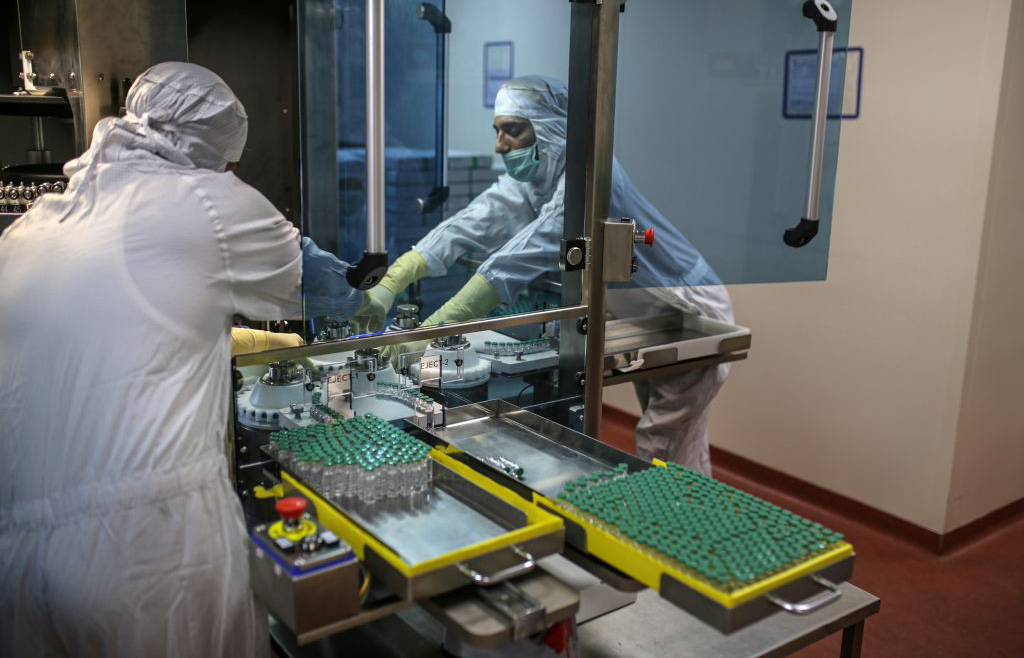全球最大的疫苗生产商,跑不赢全球最严重的疫情

今年早些时候,全球各国还在将印度血清研究所视为疫苗生产的生命线——该机构每年能为全世界生产60%的疫苗。现在,印度正艰难地抗击着有史以来最为严重的一波疫情,血清研究所也在努力地满足本国的疫苗需求。
周一,印度财政部长尼尔玛拉·西塔拉曼(Nirmala Sitharaman)告诉印度电视频道CNBC-TV18,印度政府将向血清研究所提供额外的4亿美元财政资助,使之能在全国疫苗告急的情况下扩大疫苗产能。西塔拉曼还宣布,印度的另一大疫苗供应商——巴拉特生物制药公司(Bharat Biotech)也将获得2亿美元的政府拨款,以增加其供应。
政府的财政支持对该国举步维艰的疫苗生产状况来说可谓雪中送炭。但与此同时,对于该国目前面临的这波空前严重的疫情危机,增加疫苗供应在短期内可能都无济于事。
Covishield疫苗
印度血清研究所正在与英国制药公司阿斯利康合作,在印度生产后者的新冠疫苗。
印度血清研究所将阿斯利康疫苗的本土版本称为Covishield——这是世界卫生组织批准的、能在全球分销的四种疫苗之一。
去年秋天,印度血清研究所与致力于推动疫苗全球普及的新冠肺炎疫苗实施计划(COVAX)达成协议。印度血清研究所计划将其生产的大部分疫苗出售给全球各地的中低收入国家。
但是这一计划在今年年初被拖住了脚步。
今年2月,印度血清研究所首席执行官阿达尔·波纳瓦拉(Adar Poonawalla)宣布,已“指示”该机构停止向印度以外的国家出售其生产的疫苗,从而优先满足印度国内的需求。但波纳瓦拉并未透露,政府或其他人是否下达了这样的命令,印度政府则否认了他们已“禁止疫苗出口”。
尽管如此,印度疫苗的出口进度已明显放缓。
印度血清研究所已承诺向COVAX计划提供11亿剂疫苗,其中包括5月时将提供的1亿剂。但现在,他们已经几乎不可能实现这一目标了:印度政府表示,截至周二,该公司向COVAX计划出口的疫苗仅有1,960万剂。
波纳瓦拉说,无法向国外出口疫苗也阻碍了该机构进一步提高国内产能。
“我们本应出口[我们的疫苗],并从出口国那里获得资金,但既然现在出口不了,要提高产能,我们就必须寻找其他新的方法。” 4月7日,波纳瓦拉向一家印度广播公司表示。
采访中波纳瓦拉要求印度政府提供4亿美元,帮助印度血清研究所将生产能力从每月6000万剂到7000万剂,增加到每月1亿剂。
“目前我们正优先考虑印度的需求,很难保证向每个有需要的印度人提供疫苗,”他说。
与此同时,波纳瓦拉还指责美国囤积疫苗原材料影响了血清研究所。今年2月,美国总统拜登援引《国防生产法》提升美国的疫苗生产能力,但波纳瓦拉称相关措施阻碍该公司获取包装袋和过滤器等关键原材料。
“诚挚恳求(拜登总统)解除对美国原材料出口禁运令,以提速疫苗生产,”上周五他发推文写道。
上周,波纳瓦拉接受印度媒体《商业标准》采访时表示,美国的出口禁令影响了血清研究所为美国制造商诺瓦瓦克斯生产疫苗,但未提及阿斯利康疫苗生产是否同样受限。
印度的危机
如果血清研究所获得政府资助,可能有助于提高生产能力,但印度新冠危机未解,对新冠疫苗的需求也在增加,都带来了新挑战。
周二,印度报告了25.9万例新冠新增病例,已是连续第六天超过20万例临界值。眼下的感染浪潮之前,印度每天新增病例没出现超过10万例的情况。
不断攀升的病例数将印度医疗卫生体系推向崩溃边缘。
周一印度公布了1761例与新冠相关的死亡病例,且全国医院供应不足,新增感染病例蔓延也形成严重冲击。
面对危机,印度总理莫迪周二宣布,将向18岁以上的国民提供疫苗,印度政府在一份声明中称,5月1日开始执行。
一旦印度向近10亿人提供疫苗,要如何缓解目前各邦严重的疫苗短缺,目前尚不清楚。
截至周二,印度已为本国人供应1.27亿剂疫苗,可让8%人口注射一剂。相比之下,美国已为本国人提供超过2.11亿剂,39.9%的人至少可注射一剂。
不过印度除了为本国疫苗生产商增加资金,上周还批准了俄罗斯的Sputnik V疫苗,也为境外其他制造商在印销售疫苗敞开了大门。(财富中文网)
译者:陈聪聪、夏林
今年早些时候,全球各国还在将印度血清研究所视为疫苗生产的生命线——该机构每年能为全世界生产60%的疫苗。现在,印度正艰难地抗击着有史以来最为严重的一波疫情,血清研究所也在努力地满足本国的疫苗需求。
周一,印度财政部长尼尔玛拉·西塔拉曼(Nirmala Sitharaman)告诉印度电视频道CNBC-TV18,印度政府将向血清研究所提供额外的4亿美元财政资助,使之能在全国疫苗告急的情况下扩大疫苗产能。西塔拉曼还宣布,印度的另一大疫苗供应商——巴拉特生物制药公司(Bharat Biotech)也将获得2亿美元的政府拨款,以增加其供应。
政府的财政支持对该国举步维艰的疫苗生产状况来说可谓雪中送炭。但与此同时,对于该国目前面临的这波空前严重的疫情危机,增加疫苗供应在短期内可能都无济于事。
Covishield疫苗
印度血清研究所正在与英国制药公司阿斯利康合作,在印度生产后者的新冠疫苗。
印度血清研究所将阿斯利康疫苗的本土版本称为Covishield——这是世界卫生组织批准的、能在全球分销的四种疫苗之一。
去年秋天,印度血清研究所与致力于推动疫苗全球普及的新冠肺炎疫苗实施计划(COVAX)达成协议。印度血清研究所计划将其生产的大部分疫苗出售给全球各地的中低收入国家。
但是这一计划在今年年初被拖住了脚步。
今年2月,印度血清研究所首席执行官阿达尔·波纳瓦拉(Adar Poonawalla)宣布,已“指示”该机构停止向印度以外的国家出售其生产的疫苗,从而优先满足印度国内的需求。但波纳瓦拉并未透露,政府或其他人是否下达了这样的命令,印度政府则否认了他们已“禁止疫苗出口”。
尽管如此,印度疫苗的出口进度已明显放缓。
印度血清研究所已承诺向COVAX计划提供11亿剂疫苗,其中包括5月时将提供的1亿剂。但现在,他们已经几乎不可能实现这一目标了:印度政府表示,截至周二,该公司向COVAX计划出口的疫苗仅有1,960万剂。
波纳瓦拉说,无法向国外出口疫苗也阻碍了该机构进一步提高国内产能。
“我们本应出口[我们的疫苗],并从出口国那里获得资金,但既然现在出口不了,要提高产能,我们就必须寻找其他新的方法。” 4月7日,波纳瓦拉向一家印度广播公司表示。
采访中波纳瓦拉要求印度政府提供4亿美元,帮助印度血清研究所将生产能力从每月6000万剂到7000万剂,增加到每月1亿剂。
“目前我们正优先考虑印度的需求,很难保证向每个有需要的印度人提供疫苗,”他说。
与此同时,波纳瓦拉还指责美国囤积疫苗原材料影响了血清研究所。今年2月,美国总统拜登援引《国防生产法》提升美国的疫苗生产能力,但波纳瓦拉称相关措施阻碍该公司获取包装袋和过滤器等关键原材料。
“诚挚恳求(拜登总统)解除对美国原材料出口禁运令,以提速疫苗生产,”上周五他发推文写道。
上周,波纳瓦拉接受印度媒体《商业标准》采访时表示,美国的出口禁令影响了血清研究所为美国制造商诺瓦瓦克斯生产疫苗,但未提及阿斯利康疫苗生产是否同样受限。
印度的危机
如果血清研究所获得政府资助,可能有助于提高生产能力,但印度新冠危机未解,对新冠疫苗的需求也在增加,都带来了新挑战。
周二,印度报告了25.9万例新冠新增病例,已是连续第六天超过20万例临界值。眼下的感染浪潮之前,印度每天新增病例没出现超过10万例的情况。
不断攀升的病例数将印度医疗卫生体系推向崩溃边缘。
周一印度公布了1761例与新冠相关的死亡病例,且全国医院供应不足,新增感染病例蔓延也形成严重冲击。
面对危机,印度总理莫迪周二宣布,将向18岁以上的国民提供疫苗,印度政府在一份声明中称,5月1日开始执行。
一旦印度向近10亿人提供疫苗,要如何缓解目前各邦严重的疫苗短缺,目前尚不清楚。
截至周二,印度已为本国人供应1.27亿剂疫苗,可让8%人口注射一剂。相比之下,美国已为本国人提供超过2.11亿剂,39.9%的人至少可注射一剂。
不过印度除了为本国疫苗生产商增加资金,上周还批准了俄罗斯的Sputnik V疫苗,也为境外其他制造商在印销售疫苗敞开了大门。(财富中文网)
译者:陈聪聪、夏林
Earlier this year, countries around the world counted on the Serum Institute of India, which produces 60% of the world’s vaccines each year, as a lifeline to supply them with COVID-19 jabs. Now, the Serum Institute is struggling to meet even the vaccine demands of its home country as India battles its worst-ever wave of COVID-19 infections.
On Monday, India’s finance minister, Nirmala Sitharaman, told Indian TV channel CNBC-TV18 that India’s government is granting the Serum Institute $400 million in additional government funding to help it ramp up vaccine manufacturing capacity amid a countrywide vaccine shortage. Sitharaman also announced that Indian pharmaceutical firm Bharat Biotech, another major supplier of COVID-19 vaccines in India, will receive a $200 million grant from the government to boost its supplies.
The government’s financial support will give a much-needed jolt to the country’s lagging vaccine campaign. At the same time, the additional vaccine supplies may do little to alleviate the unprecedented COVID-19 crisis facing the country in the short term.
The Serum Institute is partnering with AstraZeneca to manufacture the British pharmaceutical firm's COVID-19 vaccine in India.
The Serum Institute dubs the Indian-made version of the vaccine Covishield, and it is one of four vaccines to be approved for global distribution by the World Health Organization.
After striking deals for its vaccines last fall with COVAX, a global facility aimed at equalizing global COVID-19 vaccine access, the Serum Institute initially planned to sell a significant portion of the doses it produces to lower- and middle-income countries around the world.
But the Serum Institute’s plan hit a speed bump early this year.
In February, CEO Adar Poonawalla announced that the Serum Institute had “been directed” to stop selling its vaccines abroad to prioritize India’s domestic needs. Poonawalla did not say if the government or someone else made the order, and India’s government has denied that it had banned vaccine exports.
Still, exports of Indian-made vaccines have slowed to a crawl.
The Serum Institute had promised to supply COVAX with 1.1 billion vaccine doses, including 100 million vaccine doses by May. The Institute now has little chance of meeting that target. As of Tuesday, it has exported 19.6 million vaccines to COVAX, according to the government.
Poonawalla says that the Serum Institute’s inability to export vaccines abroad has also hampered its ability to ramp up production for domestic purposes.
“We were supposed to export [our vaccines] and get the funding from export countries, but now that that is not happening, we have to find other innovative ways to build our capacity,” Poonawalla told an Indian broadcaster on April 7.
In the interview, Poonawalla asked India’s government for $400 million to help the Serum Institute increase its manufacturing capacity from 60 million to 70 million doses per month to a projected 100 million doses per month.
“We are prioritizing the needs of India at the moment, and we are still short of being able to supply…every Indian that needs it,” he said.
Meanwhile, Poonawalla has also accused the U.S. of hoarding raw vaccine materials to the detriment of the Serum Institute. In February, U.S. President Joe Biden invoked the Defense Production Act to bolster the U.S.'s vaccine manufacturing capacity, but Poonawalla claims that the measure has hurt his company's ability to access critical raw materials like bags and filters.
"I humbly request you [President Biden] to lift the embargo of raw material exports out of the U.S. so that vaccine production can ramp up," he wrote in a tweet last Friday.
In an interview with the Indian media outlet The Business Standard last week, Poonawalla said the U.S.'s export ban has hurt the Serum Institute's ability to manufacture a vaccine for U.S.-maker Novavax without mentioning if it has dented production for AstraZeneca's vaccine.
A crisis in India
The Serum Institute’s new government funding may help it ramp up manufacturing capacity, but India’s COVID-19 crisis, and expanded access to COVID-19 vaccines, present fresh challenges.
On Tuesday, India reported over 259,000 new cases of COVID-19, its sixth straight day above the 200,000-case threshold. Before the current wave of infections, India had never recorded more than 100,000 cases a day.
The rising case counts are pushing India’s health care system to its brink.
On Monday, India reported a record 1,761 deaths related to COVID-19, and hospitals across the country are running low on supplies and being overwhelmed by the onslaught of new infections.
Amid the crisis, Prime Minister Narendra Modi announced on Tuesday that India is opening up vaccine eligibility to anyone over the age of 18 on May 1, his government said in a statement.
It is unclear how opening up vaccine eligibility to nearly 1 billion people in India will alleviate existing vaccine shortages, which remain acute in states across the country.
As of Tuesday, India has delivered 127 million vaccine shots to its citizens, enough for one dose for 8% of its population. The U.S., by comparison, has administered over 211 million doses to its citizens, with 39.9% of the population receiving at least one dose.
But in addition to India providing more funding for its domestic vaccine makers, the government approved Russia's Sputnik V vaccine last week for domestic use while also opening the door for other foreign makers to sell their vaccines in the country.













